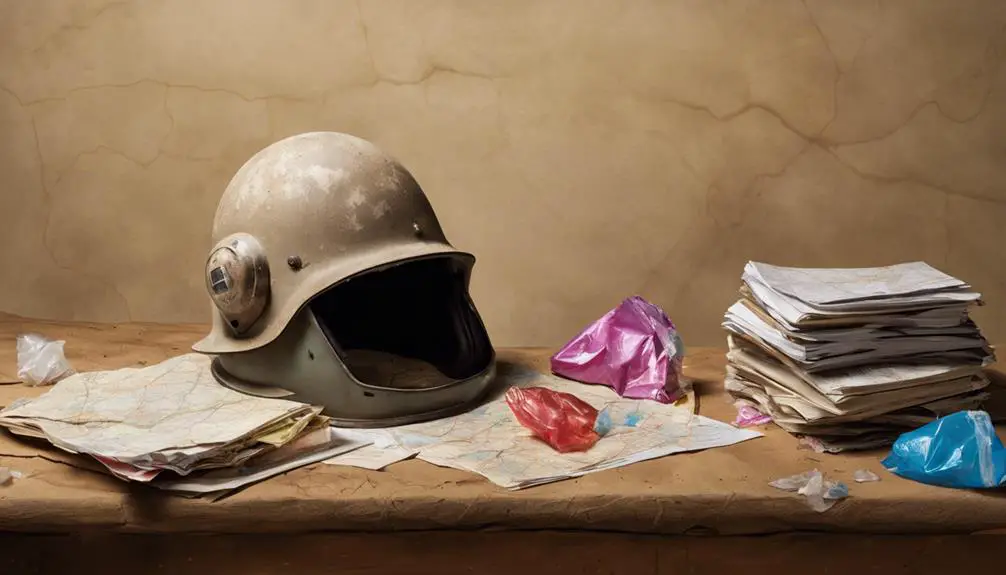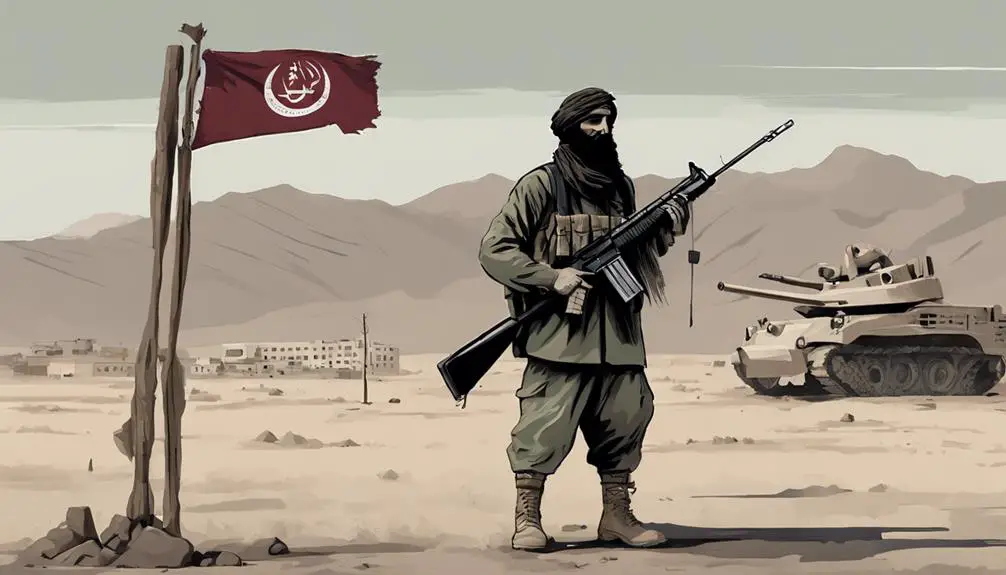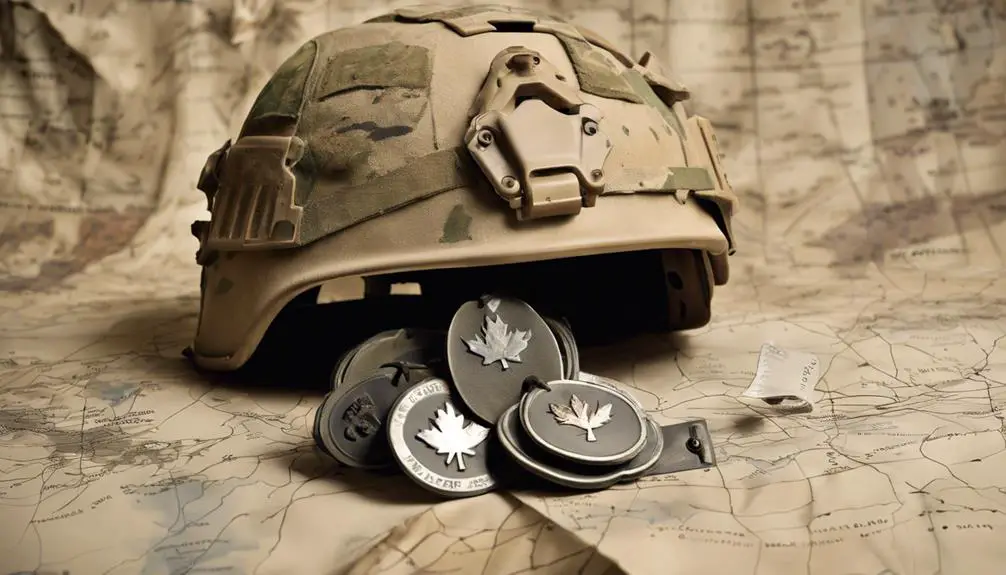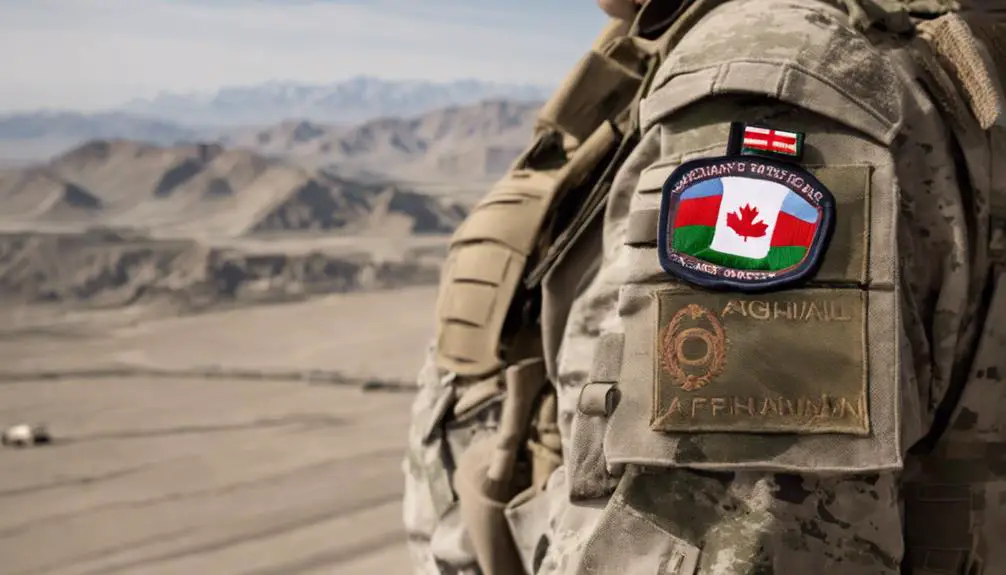As you explore the unique lexicon of Canadian military slang in Afghanistan, you'll encounter terms like 'ruck,' 'tab,' and 'Sangar' that are woven into everyday communication. This war lingo facilitates quick and efficient communication in high-stress situations, reflecting the harsh realities of war and camaraderie. You'll also discover coping mechanisms like dark humor, code names, and nicknames that help soldiers deal with the psychological toll of combat. From 'Terry Taliban' to 'Battle Buddies,' these terms reveal the Canadian military's experiences and attitudes towards the enemy and their own camaraderie. You'll uncover more insider lingo and cultural nuances that define the Canadian military's Afghanistan experience.
Slang Born in the Trenches

As you explore the world of Canadian military slang born in the trenches of Afghanistan, you'll uncover a unique lexicon shaped by the harsh realities of war and the camaraderie of soldiers. This Trench Talk, born from the experiences of Canadian Forces in Afghanistan, has become an integral part of military culture. It's a language that's raw, honest, and often humorous, developed to cope with the stresses of combat.
War Lingo, as it's also known, is a fusion of military jargon, colloquialisms, and slang. It's used to describe everything from enemy positions to military operations, and even the mundane aspects of daily life in a war zone. Terms like 'ruck' (backpack), 'tab' (to march), and 'Sangar' (a fortified outpost) have become essential vocabulary for Canadian soldiers.
This War Lingo serves as a common language, allowing soldiers to communicate quickly and efficiently in high-stress situations. As you investigate further into this unique language, you'll discover a fascinating reflection of the Canadian military's experiences in Afghanistan.
Coping Mechanisms in Combat
You'll find that War Lingo serves as more than just a communication tool, as it also doubles as a coping mechanism for soldiers dealing with the psychological and emotional toll of combat. In the high-stress environment of Afghanistan, Canadian soldiers rely on their mental armor to stay focused and resilient. This armor is reinforced by the camaraderie and trust built among battle buddies, who become an essential support system in the face of adversity.
| Term | Meaning | Context |
|---|---|---|
| Admin | Logistics and supply | "We need to get our admin in order before we move out." |
| Battle Buddies | Fellow soldiers | "My battle buddy had my back during that firefight." |
| Chinook | Transport helicopter | "The Chinook is arriving to extract us." |
| FOB | Forward Operating Base | "We're heading back to the FOB for some R&R." |
| Oscar Mike | On the move | "Oscar Mike, let's roll out!" |
Terms for the Enemy

In the heat of combat, Canadian soldiers in Afghanistan have developed a distinct vocabulary to describe the enemy, reflecting their experiences and attitudes towards the opposing forces. You're likely to hear terms like 'Terry Taliban' or simply 'Tal' to refer to the Taliban, the primary adversary in the region. These terms have become an integral part of the Canadian military's lexicon in Afghanistan.
When engaging with the enemy, soldiers use specific phrases to describe the intensity of the battle. For instance, 'kinetic' describes a high-intensity firefight, while 'slow-roll' refers to a more deliberate, cautious approach.
Here are some key terms used to describe the enemy:
- Taliban Tactics: Refers to the guerrilla warfare and ambush strategies employed by the Taliban.
- Enemy Engagements: Describes the intense firefights between Canadian forces and the Taliban.
- Haji: A derogatory term used to describe Taliban fighters.
These terms reflect the Canadian military's experiences and attitudes towards the enemy in Afghanistan, and have become an essential part of their vocabulary in the region.
Humor in the War Zone
Deployed in a war zone, Canadian soldiers often find solace in humor, using it as a coping mechanism to deal with the stresses of combat. You might hear a joke or a witty remark that helps to break the tension and lighten the mood.
In a place where danger lurks around every corner, humor becomes an essential booster, helping to keep spirits high and morale lifted. Dark humor, in particular, is a common phenomenon in war zones. It's a way for soldiers to poke fun at the absurdity and chaos surrounding them. You might hear a soldier crack a joke about the ridiculousness of a situation or make light of a close call.
This type of humor may seem morbid to outsiders, but for those in the trenches, it's a necessary release valve. By laughing together, soldiers can momentarily forget about the dangers that surround them and find a sense of camaraderie. In the war zone, humor is a crucial tool for survival, providing a much-needed respite from the harsh realities of combat.
Code Names and Nicknames

Canadian soldiers in Afghanistan often adopt code names and nicknames to identify themselves, their units, or their operations, a practice that serves as a unique aspect of military culture and communication. You might hear soldiers referring to each other by nicknames like 'Hawk' or 'Bullseye,' or using code names like 'Sierra-12' to identify their units. This practice serves as a way to maintain secrecy and add an extra layer of security to their communications.
Here are a few examples of code names and nicknames used by Canadian soldiers in Afghanistan:
- Operation Names: Operations like 'Operation Apollo' or 'Operation Kandahar' were used to identify specific missions or campaigns.
- Radio Calls: Radio calls like 'Raven-6' or 'Lion-1' were used to identify specific units or personnel on the radio.
- Unit Nicknames: Units like the 'Patricia's' (Lord Strathcona's Horse) or the 'Van Doos' (Royal 22e Régiment) were nicknamed based on their unit history or insignia.
These code names and nicknames add a layer of complexity and intrigue to military communication, and serve as a reminder of the unique culture and camaraderie that exists within the military.
Frequently Asked Questions
What Is the Average Tour of Duty for Canadian Soldiers in Afghanistan?
When you deploy to a combat zone, you're likely wondering how long you'll be there. Typically, the average tour of duty for Canadian soldiers in Afghanistan lasts around 6-7 months. However, deployment duration can vary depending on the mission's requirements.
In some cases, you might face a tour extension, which can add a few more months to your stay. Being prepared for the unexpected is crucial, but knowing the average duration can help you mentally prepare for your time in the combat zone.
How Do Soldiers Stay Connected With Family Back in Canada?
You're like a thread in a tapestry, connected to loved ones back home. While deployed, staying connected is essential.
Care Packages from family and friends are a tangible link, bringing comfort and nostalgia.
Video Calls bridge the distance, allowing you to see loved ones' smiles and share stories.
These digital and physical connections keep you anchored to home, making the distance feel less overwhelming.
What Is the Protocol for Dealing With Civilian Casualties?
When dealing with civilian casualties, you'll follow strict protocols to minimize harm and provide aid.
In the heat of the moment, your training kicks in, and you'll prioritize evacuation and medical assistance.
After the situation stabilizes, you'll document the incident and report it to command.
Civilian compensation may be offered to affected families, depending on the circumstances.
Can Canadian Soldiers Refuse a Mission if They Deem It Too Risky?
You're wondering if you can refuse a mission if you think it's too risky. The answer is, it's not that simple.
While you can't just opt out, you do have a say in the risk assessment process. If you believe a mission compromises your moral obligation to protect yourself and others, you should speak up. Your concerns will be considered, and together with your commanders, you'll decide if the mission is feasible.
Ultimately, the goal is to find a balance between achieving objectives and minimizing risk.
Are There Any Support Systems in Place for Soldiers With Ptsd?
You're likely wondering if support systems exist for soldiers struggling with PTSD. The answer is yes.
Mental Health services are available to help you cope with trauma. Family Support programs also provide a network of care for loved ones. Additionally, Peer Mentors who've faced similar challenges offer guidance.
Online Resources, such as virtual therapy sessions, are also accessible. These systems aim to provide you with a complete support network to overcome PTSD.
Conclusion
As you reflect on the Canadian military slang born in the trenches of Afghanistan, it's no coincidence that terms like 'Terry Taliban' and 'Haji' emerged as coping mechanisms in combat.
Humor in the war zone was a crucial outlet, and code names like 'Kandahar Kenny' humanized a chaotic environment.
These slang terms may have started as inside jokes, but they've become an integral part of Canadian military history, a proof of the resilience of those who served.







